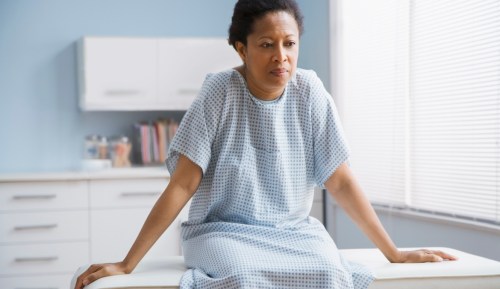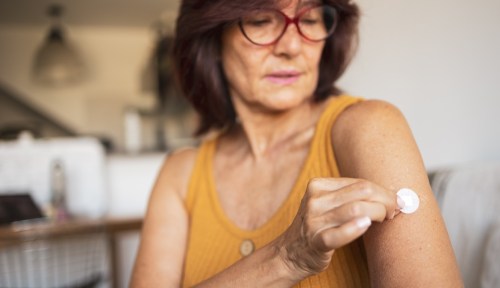Menopause Gaslighting Is a Real Problem That Greatly Impacts Women’s Care—Here’s What To Do if It Happens to You
Two million U.S. women enter menopause every year, yet doctors' menopause gaslighting keeps women from getting the treatment they need.

If you’re a woman in your mid-30s, 40s, 50s, or older, chances are you’ve experienced menopausal symptoms. Hot flashes, night sweats, mood swings, brain fog, vaginal dryness, dry skin, weight gain, and trouble sleeping are all hallmark symptoms of menopause, which “officially” begins one year after your last period, and perimenopause, a transitional period of fluctuating hormones that can last between 4 to 8 years, according to the North American Menopause Society (NAMS). Ninety-five percent of women ages 35 and up report having experienced physical symptoms of menopause, while 79 percent report having experienced menopause-related emotional symptoms, and 40 percent saying the symptoms were problematic in their lives.
Experts in This Article
a board-certified OB/GYN and chief clinical officer for Midi Health
Los Angeles-based OB/GYN who is also an integrative/Ayurvedic medicine specialist
Considering that up to 2 million women in the U.S. are expected to reach menopause each year, getting treatment for the laundry list of symptoms that can affect work, home, and social life should be easy, right? Wrong.
Research suggests that 75 percent of women who seek care for menopausal symptoms don’t receive any treatment. A 2023 survey conducted by menopause health startup Kindra and The Harris Poll found that one in three women ages 45 to 54—the age range when menopause most commonly occurs—report being misdiagnosed with another condition by their provider before finding out menopause was causing their symptoms.
Do those numbers make you mad? They should. But sadly, menopausal gaslighting is yet another example of the health-care status quo, where women’s health concerns are historically dismissed, misdiagnosed, or under-researched.
But when it comes to menopausal care, you shouldn’t have to grin and bear your symptoms—particularly if they’re disrupting your life and well-being. Here’s what you need to know about why menopausal care is so often inadequate and what you can do to make sure you get the care you need—and deserve.
Why your doctor may not know how to treat menopausal symptoms
One of the biggest factors in inadequate menopause treatment is that the vast majority of doctors aren’t trained to recognize or treat its symptoms. A 2023 study found that only 31.3 percent of surveyed OB/GYN residency programs offered menopause education, and only 29.3 percent involved trainees working at a menopause clinic. Another study from 2019 found that less than 7 percent of family medicine, OB/GYN, and internal medicine residents felt adequately prepared to manage menopausal care. That equates to a well-documented care gap for women in menopause, says Suzanne Gilberg-Lenz, MD, a board-certified OB/GYN and senior medical advisor for Kindra.
“Insufficient training on menopause care during medical school and residency contributes to the oversight,” says Dr. Gilberg-Lenz. “Addressing this gap through improved education and awareness is essential to ensuring that women receive the attention and care they deserve during this critical life stage.”
Taniqua Miller, MD, a board-certified OB/GYN with the virtual menopausal care platform Evernow, says doctors-in-training are often given clinical guidelines on questions and topics to discuss with women in their 20s during annual visits, but aren’t typically offered similar guidance for women in midlife. “We are never taught in training that if you see a patient in their 40s to tell them, ‘Hey, you might experience these symptoms,’” Dr. Miller says.
“It’s under-appreciated in the medical community how dramatically [menopause] symptoms can affect quality of life. It’s really about how you value people in society who no longer have reproductive ability.” —Taniqua Miller, MD, OB/GYN
With such limited (or non-existent) training, many doctors are not up to speed on the latest evidence-based practices for treating menopausal symptoms, says Mindy Goldman, MD, a board-certified OB/GYN and chief clinical officer for Midi Health, a virtual care resource for women 40 and up. And that greatly affects their care, she says.
“Ever since the publication of the large Women’s Health Initiative [study] in 2002, which raised concerns about [hormone therapy] increasing the risk of breast cancer, trainees in medicine have had little training in menopause in general, and the actual risks and benefits of HRT. We’ve learned a lot more since that time,” says Goldman. Subsequent research has shown lower doses of hormone therapy (HT), given to younger women for specific issues like hot flashes and vaginal dryness, helps symptoms with very low risk. “The types of hormones used today are safer and we know that for most women starting HRT soon after menopause the benefits outweigh the risks with lower risks of cardiovascular disease, bone loss, as well as symptom management, yet health care providers get little training in this area of medicine.”
Indeed, a 2020 study found that medical residents tend to shy away from offering hormone therapy (HT) altogether, even when doing so is considered to be best practice. One third of the surveyed residents declined to offer hormone therapy to newly menopausal women, despite evidence supporting the safety of that treatment.
Then there’s the persistent view among some doctors that menopause is just part of aging and we should simply roll with the changes, says Dr. Miller. The above-mentioned Kindra survey found that 36 percent of women report being worried about being dismissed about menopause by their health care providers; of those who sought care, nearly 60 percent found their doctors’ advice unhelpful.
“There’s an assumption that it’s a natural transition and should be treated naturally; that women should just tough it out,” Dr. Miller says. “It’s under-appreciated in the medical community how dramatically symptoms can affect quality of life. It’s really about how you value people in society who no longer have reproductive ability.”
How to avoid menopause gaslighting and get your concerns addressed
If you suspect you’re starting to go through the menopause transition, Dr. Miller recommends you first educate yourself on menopause, its symptoms, and treatment through trusted sources like NAMSbefore you talk to your doctor.
“We know when you have education on symptoms, outcomes actually improve,” she says. “Do your homework, understand what’s going on. Don’t be fully dependent on your clinician to educate you.”
If you feel your concerns are being dismissed by your doctor (or are worried that will happen), it’s crucial to be your own advocate, says Dr. Gilberg-Lenz, who authored The Menopause Bootcamp, which includes actionable tips to prepare for your doctor’s appointment. “Write down your symptoms and questions, being specific about what you’re experiencing, to take to your next appointment. Another great tip is to bring a supportive advocate like a friend or family member to provide another voice to your doctor,” she says.
If possible, Dr. Miller also recommends setting up a dedicated appointment to discuss menopause with your doctor, as opposed to trying to squeeze such a broad topic into an annual physical or well-woman visit. “If you still feel your concerns are being blown off, find someone else. So many women I talk to say they don’t feel seen or heard by the same OB/GYNs who delivered their babies once they reach menopause,” she adds.
Why finding specialized menopausal care can be the answer
Because menopause symptoms often occur across the medical spectrum (think: mental health symptoms like anxiety, vasomotor symptoms like heart palpitations and hot flashes, gynecological symptoms like vaginal dryness) it can be difficult to find one doctor who has the necessary training to address a wide range of concerns, says Dr. Goldman. Finding a provider who is a NAMS Certified Menopause Practitioner (NCMP) can be a godsend for many women, all three doctors say. These medical professionals have passed an additional exam proving their competency and ability to treat menopause-related conditions; they have to renew their certification every three years to retain their credentials.
“Think about the patient with sleep troubles, period problems, and weight changes, who might seek help from a sleep doctor, their OB/GYN, and their internist, never speaking to a clinician who connects the dots between these symptoms,” says Dr. Goldman. “We hear from so many patients at Midi who have appreciated being able to meet with one specialist clinician who can look at the whole picture of their specific symptoms and develop a personalized treatment program for their needs. They much prefer that to piecing together care that may not be effective from multiple providers, or worse, having their concerns dismissed altogether.”
While you can do an online search for a NCMP in your area, there are only about 1,900 of them in the U.S.—meaning it may be hard to find one close by, especially if you live in a rural location. Virtual care platforms such as Evernow, Midi, and Gennev, (a partner of Kindra) help fill that gap by providing dedicated menopausal care to women who otherwise might not have access to a NCMP.
“When you look at these platforms, they have some of the best experts in menopausal care,” says Dr. Miller. “These are practitioners who live and breathe menopause and are ready to partner with you to find solutions.”
Having access to practitioners who understand menopause and how to treat it also helps alleviate concerns women might have of being dismissed, misdiagnosed, or not receiving the proper treatment, says Dr. Goldman.
“Women need to know that there are solutions and that there is no need to suffer,” says Dr. Goldman. “Finding a specialty provider who will take the time and have the dedicated training and education to understand specific symptoms and be able to work with your individual needs—not just on one initial visit, but along the way to make adjustments and changes as needed based on what’s working for you and side effects you might experience—is the biggest solution to this situation.”
When will menopause finally get the attention it deserves?
While the medical community may be a bit behind, it is encouraging that the larger societal conversation around “the change” is, well, changing. Menopause is no longer the taboo subject it was when our grandmothers (and in some cases, mothers) went through it—even the fact that there are now TV commercials hawking menopausal products is progress.
As each new generation begins to reach perimenopause and menopause, we can expect talk about menopause to become more open and less stigmatized, much like it has been with topics such as menstruation and mental health, says Miller.
“From a generational standpoint, we are not going back. Women in Gen X are experiencing menopause differently than Baby Boomers who didn’t talk about it or question doctors,” says Dr. Miller. “I don’t think we’re putting menopause back in a box.”
Sign Up for Our Daily Newsletter
Get all the latest in wellness, trends, food, fitness, beauty, and more delivered right to your inbox.
Got it, you've been added to our email list.










